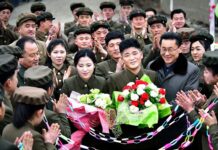
North Korea has announced that it will conduct a mass amnesty before the 70th anniversary of the country’s establishment in September, with sources in the country reporting that residents have been discussing how the amnesty will affect their lives.
“The regime has decided to reduce the sentences of regular criminals by three years, but this does not include political prisoners,” said a South Hamgyong Province-based source on July 19. “People are expecting a large number of prisoners to be released in August or September.”
The information is spreading widely among the population and the families of prisoners are eagerly awaiting the release of their loved ones, the source reported. One woman found out that her husband, who had received a 10-year sentence for human trafficking (ie. aiding defectors), would be released through the amnesty order.
“After hearing the news, she said she had been worried about how to survive three more years after bringing food and medicine to her husband for seven years. She was happy to hear that he will be released,” said the source.
Another woman whose son had been sentenced to five years in Kaechon Prison in South Pyongan Province was happy to hear that he would be released two years early. “I’m very happy that he doesn’t have to go through two more years of suffering,” a source in Ryanggang Province reported her saying.
The source added, “The three-year reduction will allegedly be applied to the sentences of all prisoners, except for anti-state criminals. People are hoping that their family members are part of the amnesty and will get out soon […] All the prisoners are excited about the amnesty.”
Local North Koreans are reportedly showing an unusual level of interest in the mass amnesty. Many recall that Kim Jong Il never conducted such an amnesty and that the Kim Jong Un regime had “introduced a prisoner reduction measure similar to the one Kim Il Sung had conducted.”
“An order for mass amnesty was handed down when Kim Jong Il died, but it only reduced prisoners’ sentences by six months. Few people were released from prison,” said a source in North Hamgyong Province, adding that it has not been officially confirmed whether an order for the mass amnesty was actually handed down.
North Korea has traditionally given amnesty to prisoners on important political holidays. Since Kim Jong Un gained power, the authorities have announced mass amnesty orders three times, with the last being on July 16.
North Korea has announced mass amnesties previously in January 2012 (the 100th birthday of Kim Il Sung and Kim Jong Il’s 70th birthday), and most recently in July 2015 to celebrate the 70th anniversary of liberation from Japanese occupation and the 70th anniversary of the establishment of the Korean Workers’ Party.
The announcement of mass amnesty three years after the last comes as the regime seeks to place emphasis on Kim Jong Un as a “loving leader” before the 70th anniversary of the establishment of the North Korean state and is aimed at increasing popular loyalty and solidarity toward the regime. The move to declare mass amnesty is connected to the regime’s attempts to portray Kim as a “leader who makes generous decisions because of his love for the people.”
The recent articles in North Korea’s state-run media about Kim’s strong criticisms toward officials during his on-the-spot guidance may also be understood as part of the regime’s “love-for-the-people politics.” By showing Kim publicly criticizing officials for not working hard to improve the national economy, the regime is redirecting anger toward these officials and placing blame for the country’s woes on them.



















